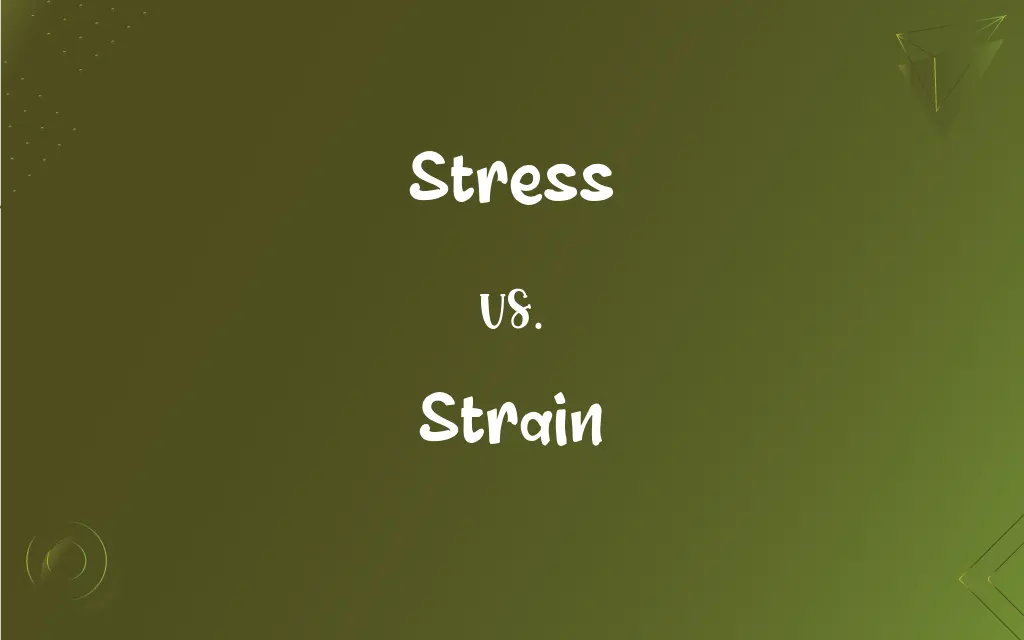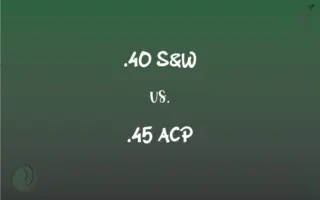Stress vs. Strain: What's the Difference?
Edited by Aimie Carlson || By Harlon Moss || Updated on October 21, 2023
Stress is the force per unit area; strain is the deformation resulting from stress.

Key Differences
Stress is a measure of the internal forces acting within a material when subjected to external forces. It represents the intensity of those forces, often described as force per unit area. Strain, on the other hand, is a measure of how much a material deforms in response to an applied stress. It is the ratio of the change in dimension to the original dimension.
Stress is generally categorized into various types like tensile (pulling) stress, compressive (pushing) stress, and shear stress. Each type of stress acts differently on a material. Strain too has its categories: tensile strain, compressive strain, and shear strain, indicating the type of deformation a material undergoes in response to the corresponding stress.
Stress can be thought of as the "cause" in the relationship, and strain is the "effect." When a material experiences stress, it responds by deforming, which is the strain. The relationship between stress and strain is defined by a material's mechanical properties, such as its elasticity and plasticity.
For many materials, especially metals, the relationship between stress and strain is linear up to a point, known as the elastic limit. Beyond this point, permanent deformation occurs. The material's ability to undergo deformation without breaking or cracking is often described by its ductility or brittleness, influenced by the balance between stress and strain.
Both stress and strain are fundamental concepts in the field of mechanics of materials. While stress describes the internal resistive force, strain describes how that force changes the material's shape or size.
ADVERTISEMENT
Comparison Chart
Definition
Force per unit area.
Deformation resulting from stress.
Units
Pascals (Pa), Newtons per square meter (N/m^2).
Dimensionless (often expressed as a percentage).
Types
Tensile, Compressive, Shear.
Tensile, Compressive, Shear.
Cause or Effect
Cause (Applied force).
Effect (Resultant deformation).
Relationship
Determines the intensity of internal forces in a material.
Indicates the material's deformation response.
ADVERTISEMENT
Stress and Strain Definitions
Stress
A force exerted on an object causing deformation.
The metal bar experienced stress when force was applied.
Strain
A genetic variant or subtype of a microorganism.
This flu vaccine protects against multiple strains of the virus.
Stress
An external stimulus or event that provokes a response.
Losing a job can be a major stress in one's life.
Strain
Deformation of a material due to applied stress.
The rubber band showed strain as it was stretched.
Stress
The importance given to a particular aspect.
The coach put stress on teamwork and communication.
Strain
Physical or mental tension resulting from challenging situations.
After working for 12 hours, she felt a strain on her eyes.
Stress
Emphasis placed on a word or phrase in speech.
The word record can have different meanings based on stress placement.
Strain
Effort or endeavor to achieve something.
The athlete put a lot of strain into breaking the record.
Stress
Mental or emotional tension due to adverse situations.
Finals week brought a lot of stress for students.
Strain
To filter or separate using a sieve.
She strained the pasta to remove the excess water.
Stress
Importance, significance, or emphasis placed on something.
Strain
To pull, draw, or stretch tight
The heavy load strained the rope.
Stress
The relative force with which a sound or syllable is spoken.
Strain
(Physics) To cause distortion of (a body's parts or shape) by applying an external force; deform.
FAQs
What units are used for stress?
Stress is measured in Pascals (Pa) or Newtons per square meter (N/m^2).
Why might a material show no strain even when stressed?
Some materials can bear stress up to a threshold without noticeable deformation, or they may be rigid enough to resist strain.
What happens after a material's elastic limit regarding strain?
Beyond the elastic limit, permanent deformation occurs, and the material may not return to its original shape.
How does strain gauge work?
A strain gauge measures strain based on the change in its electrical resistance when deformed.
Can strain result in failure of a material?
Excessive strain can lead to failure or breaking of a material.
Can stress occur without strain?
No, when stress is applied to an elastic material, it will cause some degree of strain.
Is strain a dimensionless quantity?
Yes, strain is dimensionless and is often expressed as a percentage.
Why do materials strain?
Materials strain as a response to the applied stress, undergoing deformation.
How does stress relate to pressure?
Both involve force per unit area, but stress typically refers to solid materials, while pressure often refers to fluids.
Can stress be beneficial?
In life, moderate stress can drive motivation and adaptation. In materials, controlled stress can shape or strengthen them.
Are there good methods to manage emotional stress?
Yes, techniques like meditation, exercise, and seeking social support can help manage emotional stress.
Are stress and strain directly proportional?
For many materials within their elastic limit, stress and strain are directly proportional, described by Hooke's Law.
What's the difference between tensile and compressive stress?
Tensile stress pulls materials apart, while compressive stress pushes them together.
What's the role of strain in microbiology?
In microbiology, a strain refers to a genetic variant or subtype of a microorganism.
In linguistics, how is stress used?
In linguistics, stress refers to the emphasis on certain syllables or words when speaking.
What is stress in terms of physics?
Stress is the force applied per unit area of a material.
How is strain measured?
Strain is measured as the ratio of change in dimension to the original dimension.
How does temperature affect stress and strain?
Temperature can alter material properties, potentially affecting its stress-strain relationship.
How is emotional stress different from mechanical stress?
Emotional stress refers to mental tension, while mechanical stress refers to force applied to a material.
About Author
Written by
Harlon MossHarlon is a seasoned quality moderator and accomplished content writer for Difference Wiki. An alumnus of the prestigious University of California, he earned his degree in Computer Science. Leveraging his academic background, Harlon brings a meticulous and informed perspective to his work, ensuring content accuracy and excellence.
Edited by
Aimie CarlsonAimie Carlson, holding a master's degree in English literature, is a fervent English language enthusiast. She lends her writing talents to Difference Wiki, a prominent website that specializes in comparisons, offering readers insightful analyses that both captivate and inform.































































